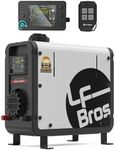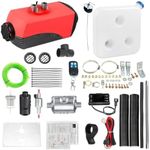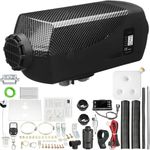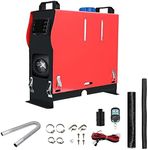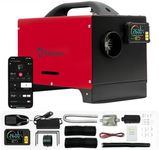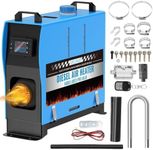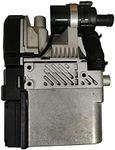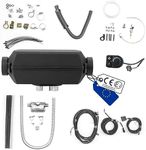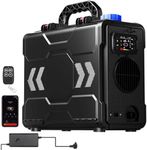Buying Guide for the Best Diesel Heater
Choosing the right diesel heater for your needs can make a significant difference in comfort and efficiency, especially in cold weather conditions. Diesel heaters are commonly used in vehicles, boats, and off-grid cabins to provide reliable and efficient heating. To make an informed decision, it's important to understand the key specifications and how they relate to your specific needs. Here are the main factors to consider when selecting a diesel heater.Heating Capacity (BTU or kW)Heating capacity, measured in BTUs (British Thermal Units) or kilowatts (kW), indicates the amount of heat the heater can produce. This is crucial because it determines how effectively the heater can warm up your space. For small spaces like a van or a small boat, a heater with a lower capacity (around 2-3 kW) is usually sufficient. For larger spaces, such as a big RV or a cabin, you might need a heater with a higher capacity (5 kW or more). Consider the size of the area you need to heat and choose a heater with an appropriate capacity to ensure comfort without wasting fuel.
Fuel ConsumptionFuel consumption refers to the amount of diesel the heater uses over a specific period, typically measured in liters per hour. This is important for understanding the operational cost and how often you will need to refuel. Lower fuel consumption is generally better, as it means the heater is more efficient. However, higher capacity heaters will naturally consume more fuel. If you plan to use the heater frequently or for extended periods, look for models with lower fuel consumption to save on fuel costs and reduce the frequency of refueling.
Power SourceDiesel heaters require a power source to operate, usually a 12V or 24V battery. The power source is important because it affects the installation and compatibility with your existing setup. Most vehicles and boats use 12V systems, so a 12V diesel heater would be a straightforward choice. If you have a 24V system, ensure the heater is compatible or consider using a voltage converter. Choose a heater that matches your power system to avoid additional costs and complications.
Noise LevelNoise level is an important consideration, especially if you plan to use the heater in a confined space like a vehicle or a small cabin. Diesel heaters can produce noise from the combustion process and the fan. Look for models that are specifically designed to operate quietly if noise is a concern for you. Manufacturers often provide noise level ratings in decibels (dB). A lower dB rating means a quieter operation. If you are sensitive to noise or plan to use the heater while sleeping, opt for a model with a lower noise level.
Installation and MaintenanceThe ease of installation and maintenance is another key factor to consider. Some diesel heaters come with comprehensive installation kits and clear instructions, making them easier to set up. Others might require professional installation, which can add to the overall cost. Additionally, consider the maintenance requirements of the heater. Regular maintenance is necessary to ensure efficient operation and longevity. Look for models with accessible components and clear maintenance guidelines. If you prefer a hassle-free experience, choose a heater known for its ease of installation and low maintenance needs.
Safety FeaturesSafety features are crucial when dealing with any heating device. Diesel heaters should have built-in safety mechanisms such as overheat protection, flame-out detection, and automatic shut-off. These features help prevent accidents and ensure safe operation. When choosing a diesel heater, prioritize models that offer comprehensive safety features. This is especially important if you plan to use the heater in a confined space or while sleeping. Ensuring the heater has adequate safety measures will give you peace of mind and protect you from potential hazards.
